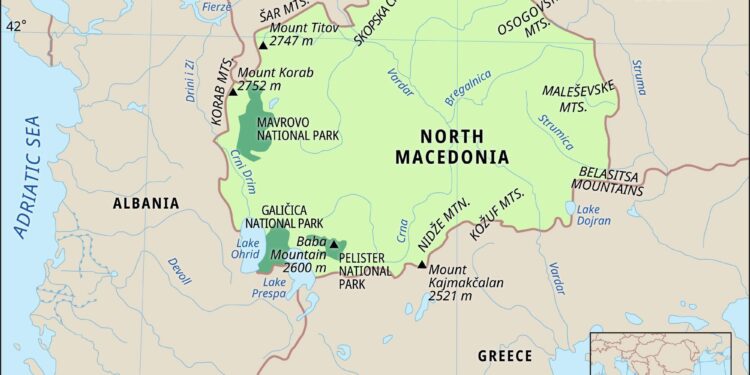The U.S. Department of State has released its 2024 Country Reports on Human Rights Practices, offering a comprehensive assessment of North Macedonia’s human rights landscape over the past year. The report highlights both progress and ongoing challenges in the Balkan nation’s efforts to uphold civil liberties, political freedoms, and the rule of law. This article examines key findings from the report, shedding light on North Macedonia’s advancements as well as areas requiring attention ahead.
Human Rights Overview in North Macedonia Reveals Progress and Persistent Challenges
In 2024, North Macedonia continued to demonstrate commitment towards strengthening human rights protections, highlighted by several legislative reforms and increased government accountability. Authorities enhanced efforts to combat corruption and promote transparency, while improvements were noted in the treatment of minority groups, especially the Albanian and Roma communities. Key progress was made in expanding access to education and healthcare, with targeted programs to assist marginalized populations. Additionally, civil society organizations reported greater space for advocacy and freedom of expression, reflecting a positive, albeit cautious, shift in the country’s human rights landscape.
Despite these advances, significant challenges remain. Persistent issues include discrimination, police misconduct, and inadequate judicial independence, which continue to undermine equitable rule of law. Vulnerable groups, such as refugees and persons with disabilities, face barriers in accessing fundamental services. The report also flags concerns over media censorship and political interference in public institutions. Below is a summary of major human rights concerns documented in the latest report:
- Ethnic tensions and limited minority integration
- Reports of unlawful arrests and detention
- Gender-based violence still prevalent
- Restrictive treatment of asylum seekers
- Impunity for abuses committed by law enforcement
| Category | Status | Notes |
|---|---|---|
| Freedom of Expression | Partial Progress | Improved press freedom, but some political pressure persists |
| Judicial Independence | Ongoing Challenges | Cases of political interference noted |
| Minority Rights | Noticeable Improvement | Enhanced inclusion policies adopted |
| Police Conduct | Concerns Remain | Reports of excessive force and lack of accountability |
Analysis of Civil Liberties and Government Accountability in the 2024 Report
Throughout 2024, North Macedonia demonstrated a mixed record on civil liberties, marked by both significant advancements and pressing challenges. While freedom of speech and assembly remained constitutionally protected, reports underscored ongoing governmental pressures and occasional harassment directed at journalists and activists. Independent media outlets faced economic and administrative obstacles, complicating efforts to hold authorities accountable. Despite these hurdles, civil society organizations actively engaged in monitoring human rights abuses, contributing vital oversight in a politically polarized environment.
Key issues highlighted include:
- Instances of police overreach during public demonstrations
- Selective application of laws impacting minority communities
- Corruption concerns within local government units
- Lack of transparency in judicial proceedings involving politically sensitive cases
| Category | Positive Developments | Ongoing Challenges |
|---|---|---|
| Freedom of Expression | Active civil society engagement | Government pressure on media outlets |
| Law Enforcement | Training on human rights standards | Use of excessive force during protests |
| Judicial Accountability | Increased case transparency efforts | Political interference in select trials |
Recommendations for Strengthening Rule of Law and Protecting Minority Rights
To enhance the integrity of the legal system, it is imperative that North Macedonia undertakes comprehensive judicial reforms aimed at ensuring impartiality and transparency. Strengthening the independence of the judiciary requires enhanced protections for judges and prosecutors against political interference, alongside stricter enforcement of accountability measures for legal practitioners. Furthermore, investing in continuous training programs focused on human rights standards will equip law enforcement officials and judicial authorities with the necessary tools to uphold justice fairly and consistently.
Protecting minority rights demands targeted policies that promote inclusion and equal participation in social, economic, and political spheres. Authorities should prioritize:
- Anti-discrimination enforcement: Implementing robust mechanisms to investigate and penalize acts of discrimination swiftly.
- Language rights enhancement: Ensuring access to public services and education in minority languages to preserve cultural identity.
- Community engagement: Strengthening dialogue channels between government bodies and minority representatives to address grievances effectively.
| Area of Reform | Priority Actions | Expected Impact |
|---|---|---|
| Judicial Independence | Safeguard against political influence | Increased public trust in courts |
| Anti-Discrimination | Swift investigations and penalties | Reduction in minority marginalization |
| Language Rights | Multilingual public services | Preservation of minority cultures |
Wrapping Up
In summary, the 2024 Country Reports on Human Rights Practices provide a detailed and critical assessment of North Macedonia’s human rights landscape over the past year. While the report highlights continued efforts by the government to address issues such as freedom of expression, judicial reforms, and minority rights, it also underscores persistent challenges including corruption, discrimination, and occasional restrictions on civil liberties. As North Macedonia continues its path toward greater democratic consolidation and integration with Euro-Atlantic institutions, the findings of the U.S. Department of State’s report serve as a crucial benchmark for policymakers, civil society, and international partners committed to advancing human rights in the country.
















